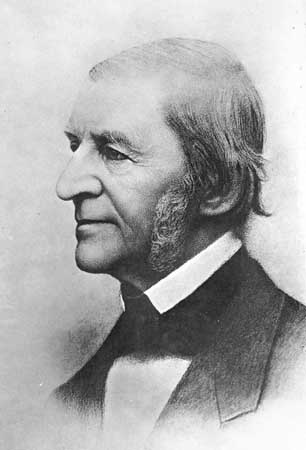Transcendentalism
American movement
19th-century movement of writers and philosophers in New England who were loosely bound together by adherence to an idealistic system of thought based on a belief in the essential unity of all creation, the innate goodness of man, and the supremacy of insight over logic and experience for the revelation of the deepest truths. German transcendentalism (especially as it was refracted by Samuel Taylor Coleridge and Thomas Carlyle), Platonism and Neoplatonism, the Indian and Chinese scriptures, and the writings of such mystics as Emanuel Swedenborg and Jakob Böhme were sources to which the New England Transcendentalists turned in their search for a liberating philosophy.
 Eclectic and cosmopolitan in its sources and part of the Romantic movement, New England Transcendentalism originated in the area around Concord, Mass., and from 1830 to 1855 represented a battle between the younger and older generations and the emergence of a new national culture based on native materials. It attracted such diverse and highly individualistic figures as Ralph Waldo Emerson, Henry David Thoreau, Margaret Fuller, Orestes Brownson, Elizabeth Palmer Peabody, and James Freeman Clarke, as well as George Ripley, Bronson Alcott, the younger W.E. Channing, and W.H. Channing. In 1840 Emerson and Margaret Fuller founded The Dial (1840–44), the prototypal “little magazine” wherein some of the best writings by minor Transcendentalists appeared. The writings of the Transcendentalists and those of contemporaries such as Walt Whitman, Herman Melville, and Nathaniel Hawthorne, for whom they prepared the ground, represent the first flowering of the American artistic genius and introduced the American Renaissance in literature.
Eclectic and cosmopolitan in its sources and part of the Romantic movement, New England Transcendentalism originated in the area around Concord, Mass., and from 1830 to 1855 represented a battle between the younger and older generations and the emergence of a new national culture based on native materials. It attracted such diverse and highly individualistic figures as Ralph Waldo Emerson, Henry David Thoreau, Margaret Fuller, Orestes Brownson, Elizabeth Palmer Peabody, and James Freeman Clarke, as well as George Ripley, Bronson Alcott, the younger W.E. Channing, and W.H. Channing. In 1840 Emerson and Margaret Fuller founded The Dial (1840–44), the prototypal “little magazine” wherein some of the best writings by minor Transcendentalists appeared. The writings of the Transcendentalists and those of contemporaries such as Walt Whitman, Herman Melville, and Nathaniel Hawthorne, for whom they prepared the ground, represent the first flowering of the American artistic genius and introduced the American Renaissance in literature.In their religious quest, the Transcendentalists rejected the conventions of 18th-century thought; and what began in a dissatisfaction with Unitarianism developed into a repudiation of the whole established order. They were leaders in such contemporary reform movements as anarchistic, socialistic, and communistic schemes for living (Thoreau; Alcott at Fruitlands; Ripley at Brook Farm); suffrage for women; better conditions for workers; temperance for all; modifications of dress and diet; the rise of free religion; educational innovation; and other humanitarian causes.
Heavily indebted to the Transcendentalists' organic philosophy, aesthetics, and democratic aspirations have been the pragmatism of William James and John Dewey, the environmental planning of Benton MacKaye and Lewis Mumford, the architecture (and writings) of Louis Sullivan and Frank Lloyd Wright, and the American “modernism” in the arts promoted by Alfred Stieglitz.
- Merlo
- mermaid
- Mermaid Tavern
- Merman, Ethel
- Merneptah
- Merodach-Baladan II
- Meroe
- Meroitic language
- Meron
- Merovech
- Merovingian art
- Merovingian dynasty
- Merovingian script
- Merriam, Clinton Hart
- Merriam-Webster dictionary
- Merrick, David
- Merrifield, Bruce
- Merrill, Charles E.
- Merrill, Frank Dow
- Merrill, James
- Merrill Lynch & Co., Inc.
- Merrimack
- Merrimack River
- Merriman, John X.
- Merritt, Anna Lea